
Processes
Scope & Guideline
Exploring the frontiers of chemical and process engineering.
Introduction
Aims and Scopes
- Chemical Engineering Processes:
Research on the optimization, design, and modeling of chemical processes, including reaction kinetics, mass transfer, and thermodynamics. - Environmental Processes:
Studies related to wastewater treatment, pollution control, and resource recovery, with a focus on sustainable practices and technologies. - Bioprocessing and Biotechnology:
Exploration of biotechnological processes for the production of biofuels, bioplastics, and biopharmaceuticals, emphasizing the role of microorganisms and enzymes. - Energy Processes:
Investigations into energy conversion technologies, renewable energy systems, and energy efficiency improvements in industrial processes. - Materials Engineering:
Research on material properties, synthesis, and applications, particularly in relation to energy storage, catalysis, and biomedical applications. - Modeling and Simulation:
Use of computational methods, including CFD and machine learning, for process optimization, fault diagnosis, and predictive maintenance in various engineering fields.
Trending and Emerging
- Sustainable and Green Technologies:
A significant increase in research focused on sustainable processes, including waste valorization, green chemistry, and eco-friendly extraction methods, aligns with global sustainability goals. - Machine Learning and AI in Process Optimization:
The integration of artificial intelligence and machine learning techniques for predictive maintenance, process control, and optimization is rapidly gaining traction in recent publications. - Renewable Energy Systems:
Research on the development and optimization of renewable energy technologies, especially in relation to hydrogen production and carbon capture, is becoming increasingly prominent. - Bioprocess Optimization:
There is a growing focus on bioprocessing technologies, particularly those that utilize microbial systems for waste treatment and bioenergy production. - Advanced Materials for Energy Applications:
Emerging research on novel materials for energy storage, catalysis, and environmental remediation is trending, emphasizing the need for innovative solutions in energy transition.
Declining or Waning
- Traditional Fuel Processing Technologies:
There is a noticeable decrease in research focused on conventional fossil fuel processing methods, as the emphasis shifts towards renewable energy and sustainable alternatives. - Low-Temperature Chemical Processes:
Research related to low-temperature chemical reactions appears to be waning as more studies are directed towards high-efficiency and high-temperature processes that promise better yields. - Conventional Wastewater Treatment Methods:
Interest in traditional wastewater treatment technologies is diminishing in favor of innovative, integrated approaches that prioritize bioremediation and resource recovery. - Standardized Quality Control Processes:
The focus on rigid quality control methodologies is decreasing, with a growing preference for adaptive and intelligent systems that utilize machine learning and real-time data analytics. - Single-Discipline Research:
There is a declining trend in research that does not integrate multiple disciplines, as interdisciplinary approaches are increasingly favored for addressing complex engineering challenges.
Similar Journals
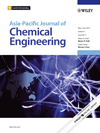
Asia-Pacific Journal of Chemical Engineering
Shaping Tomorrow's Innovations in the Asia-Pacific Region.The Asia-Pacific Journal of Chemical Engineering, published by WILEY, serves as a vital forum for the dissemination of innovative research in the interdisciplinary domains of chemical engineering, renewable energy, sustainability, and waste management. Established in 2006, this esteemed journal has achieved a notable impact factor that reflects its commitment to advancing knowledge and practices within the chemical engineering community. With its Q3 category rankings across various fields, including Chemical Engineering (Miscellaneous), Renewable Energy, Sustainability and the Environment, and Waste Management and Disposal, the journal holds a significant position among its peers, assuring readers of quality and relevance in published content. Although it does not offer Open Access options, the Asia-Pacific Journal of Chemical Engineering remains an essential resource for researchers, professionals, and students aiming to stay at the forefront of innovations affecting the Asia-Pacific region and beyond. The journal's broad scope covers diverse topics, making it an integral part of the academic landscape from 2006 to 2024.

KOREAN JOURNAL OF CHEMICAL ENGINEERING
Innovating the Future of Chemical Engineering.The Korean Journal of Chemical Engineering is a prestigious publication by the Korean Institute of Chemical Engineers, dedicated to advancing the field of chemical engineering and its associated sciences. Established in 1984, this journal has made significant contributions to the dissemination of innovative research, covering a broad spectrum of topics within chemical engineering and general chemistry. With a current impact factor placing it in the Q2 quartile within both the chemical engineering and chemistry categories, it is recognized for its rigorous peer-review process and high-quality articles. The journal provides a valuable platform for researchers, professionals, and students to share their findings and collaborate on emerging methodologies and technologies. Although it does not offer open access options, its broad international readership, bolstered by its Scopus rankings — including a commendable #108 in general chemical engineering — ensures widespread visibility and dissemination of published works. As it approaches its 40th anniversary in 2024, the Korean Journal of Chemical Engineering continues to be an essential resource for anyone engaged in the field, driving innovation and academic dialogue worldwide.

ChemEngineering
Fostering Collaboration in Chemical Engineering ExcellenceChemEngineering is a prominent open-access journal published by MDPI that has been dedicated to the dissemination of high-quality research in the field of chemical engineering since its inception in 2017. Operating out of Switzerland, this journal addresses a diverse range of topics, including energy production, process optimization, and innovations in materials science, thereby attracting contributions from researchers and professionals worldwide. With an impressive Q2 ranking in Chemical Engineering and Engineering, as well as a Q3 ranking in Energy for 2023, ChemEngineering is positioned as a crucial platform for advancing knowledge in its fields. The journal's commitment to open access ensures that its content is readily available to a broad audience, promoting the free exchange of ideas and fostering collaborations. Researchers, professionals, and students alike benefit from the journal's focus on cutting-edge research, making it an essential resource for anyone interested in the ever-evolving landscape of chemical engineering.
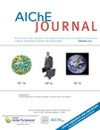
AICHE JOURNAL
Elevating Chemical Engineering Discourse and PracticeAICHE JOURNAL, published by Wiley, is a premier academic journal that has been at the forefront of chemical engineering research since its inception in 1955. With an ISSN of 0001-1541 and an E-ISSN of 1547-5905, this esteemed journal has carved a niche within several vital fields, boasting a 2023 categorization of Q1 in Chemical Engineering (Miscellaneous), Q2 in Biotechnology, and Q2 in Environmental Engineering. The journal’s significant impact is demonstrated through its Scopus rankings, particularly its rank of #62 in General Chemical Engineering and #54 in Environmental Engineering, showcasing its influence and reach in these disciplines. Although not available as Open Access, AICHE JOURNAL plays a critical role in disseminating cutting-edge research essential for advancing knowledge and practice among professionals, researchers, and students in chemical and environmental engineering realms. With convergence expected until 2024, it remains a vital resource for the latest developments, methodologies, and innovations that shape the future of technology and sustainability in the scientific community.
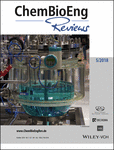
ChemBioEng Reviews
Cultivating Knowledge for Tomorrow's Chemical InnovationsChemBioEng Reviews is a premier academic journal dedicated to advancing the fields of biochemistry, bioengineering, and chemical engineering. Published by WILEY-V C H VERLAG GMBH, this journal serves as an essential platform for researchers and professionals seeking to disseminate groundbreaking insights and innovations. With a remarkable impact factor and a solid reputation, it is ranked in the top quartile (Q1) across multiple disciplines, including Biochemistry, Bioengineering, and Industrial and Manufacturing Engineering. The journal's comprehensive scope covers the synthesis, analysis, and application of bioengineered solutions, making it a vital resource for anyone involved in process chemistry and technology. With an unwavering commitment to high-quality scientific discourse from 2014 to 2024, ChemBioEng Reviews is not only pivotal for the academic community but also contributes to industry advancements in filtration, separation processes, and the intersection of chemical and biological engineering.
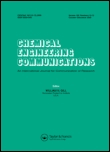
CHEMICAL ENGINEERING COMMUNICATIONS
Pioneering Research for a Sustainable Future.Chemical Engineering Communications, published by Taylor & Francis Inc, is a distinguished journal within the realms of Chemical Engineering and Chemistry. With an ISSN of 0098-6445, this journal plays a pivotal role in disseminating innovative research, critical reviews, and insightful discussions that encompass a broad spectrum of topics in these fields. The journal boasts a commendable Q2 ranking in the 2023 category of chemical engineering and general chemistry, reflecting its significant contribution to the scientific community. Operating under a rigorous peer-review process, the journal attracts high-quality submissions from global researchers. Although currently not an Open Access journal, it provides extensive archive access for users interested in exploring past advancements from its inception in 1973 through to 2024. With a commitment to advancing knowledge and fostering collaboration among academia and industry, Chemical Engineering Communications remains an essential resource for professionals and students aiming to stay abreast of the latest developments in chemical sciences.

PERIODICA POLYTECHNICA-CHEMICAL ENGINEERING
Connecting Experts to Transform Chemical EngineeringPERIODICA POLYTECHNICA-CHEMICAL ENGINEERING is a distinguished journal published by the Budapest University of Technology and Economics, focusing on the diverse field of chemical engineering. Established in 1968 and transitioning to Open Access since 1999, this journal provides a vital platform for sharing cutting-edge research and innovations in chemical engineering and related disciplines. With an HIndex that reflects its growing influence and categorized in the Q3 Quartile for Chemical Engineering (miscellaneous) in 2023, PERIODICA POLYTECHNICA aims to facilitate the dissemination of knowledge among researchers, professionals, and students alike. The journal's Scopus rankings in Environmental Science, General Chemistry, Materials Science, and Biochemistry showcase its multidisciplinary approach, making it an essential resource for anyone engaged in advancing their expertise in chemical engineering and the broader scientific community. Located in Hungary, PERIODICA POLYTECHNICA continues to contribute to the academic dialogue and inspire innovative solutions to contemporary challenges.

Frontiers of Chemical Science and Engineering
Pioneering Research for a Sustainable FutureFrontiers of Chemical Science and Engineering is an esteemed journal published by SPRINGER, dedicated to advancing the rapidly evolving domain of chemical engineering. Located in New York, USA, this journal provides a vibrant platform for disseminating groundbreaking research and innovative methodologies in the field. With an impressive Q1 ranking in Chemical Engineering and a Scopus ranking of 54 out of 273, it occupies a prominent position, reflecting its high impact and relevance among academic circles. Since its inception in 2011, it has fostered interdisciplinary collaboration, encompassing diverse topics such as process engineering, environmental sustainability, and nanotechnology, making it a vital resource for researchers, professionals, and students alike. The journal's open access policy further enhances accessibility, ensuring that cutting-edge research is readily available to a global audience. As the field continues to evolve, contributions to Frontiers of Chemical Science and Engineering play an essential role in shaping future advancements and empowering the next generation of engineers.
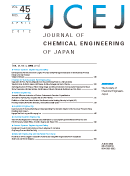
JOURNAL OF CHEMICAL ENGINEERING OF JAPAN
Advancing Chemical Innovation in JapanJOURNAL OF CHEMICAL ENGINEERING OF JAPAN is a distinguished academic publication in the field of chemical engineering and chemistry, published by Taylor & Francis Ltd. With its ISSN 0021-9592 and E-ISSN 1881-1299, this journal has been a vital resource for researchers and practitioners since its inception in 1968 and continues to provide essential insights and advancements through 2024. The journal operates under an Open Access model as of 2023, promoting wider dissemination of research findings and encouraging collaboration within the global scientific community. Currently categorized in the Q4 quartile for both Chemical Engineering and Chemistry (miscellaneous) in 2023, it ranks within the lower percentiles of its respective fields, offering a platform for emerging scholars to publish their work and gain visibility. As part of Japan's academic landscape, it addresses numerous aspects of chemical engineering, fostering innovation and technical development that contribute to the industry's growth. Engaging with this journal is paramount for those looking to stay informed on the latest research trends and applications in chemical processes.

Hemijska Industrija
Innovating Chemistry: Bridging Research and ApplicationHemijska Industrija, an esteemed journal published by the Association of Chemical Engineers of Serbia, serves as a critical platform for advancing knowledge in the fields of chemical engineering and chemistry since its inception in 1989. With an Open Access policy adopted in 2017, the journal provides global access to cutting-edge research and innovative findings, enhancing visibility for authors and fostering collaboration among researchers, professionals, and students alike. This peer-reviewed journal currently holds a Q3 ranking in both Chemical Engineering (miscellaneous) and Chemistry (miscellaneous) categories, signifying its growing impact in these fields. Published in Belgrade, Serbia, Hemijska Industrija not only disseminates high-quality articles from various disciplines within chemical science but also emphasizes interdisciplinary approaches and practical applications, making it an invaluable resource for anyone seeking to stay at the forefront of chemical innovations.